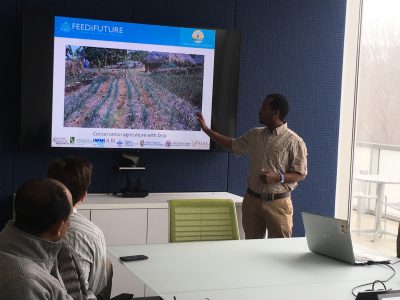On Wednesday April, 4th 2018, Dr. Seifu Tilahun, Associate Professor of Hyrdrology and Faculty of Civil and Water Resources Engineering at Bahir Dar University, held a seminar regarding the topic of Smallholder Dry Period Irrigation Water Management in Lake Tana Basin: Shallow Ground Water Recharge and On-farm water management.
 More than 85% of the population of in Ethiopia are living in rural areas that depend on the rain-fed agriculture for their livelihood. With the rapidly increasing population, competition for land and water is growing for agricultural intensification. In Ethiopia, less than 10% of the irrigable area has been developed. The main limitation of increasing the irrigable areas is a severe lack of surface water during an extended dry phases for almost seven months. Small scale household have started using irrigation using shallow ground wells on sloping lands that have sprung up with minimal governmental intervention. It could be one of the strategies to increase the irrigated areas without large investments.
More than 85% of the population of in Ethiopia are living in rural areas that depend on the rain-fed agriculture for their livelihood. With the rapidly increasing population, competition for land and water is growing for agricultural intensification. In Ethiopia, less than 10% of the irrigable area has been developed. The main limitation of increasing the irrigable areas is a severe lack of surface water during an extended dry phases for almost seven months. Small scale household have started using irrigation using shallow ground wells on sloping lands that have sprung up with minimal governmental intervention. It could be one of the strategies to increase the irrigated areas without large investments.
As part of the Innovation Lab for Small Scale Irrigation project, shallow ground water levels and river discharge were measured over a three-year period in the Robit Bata and Dangishta watersheds in Northern Ethiopian highlands for assessing recharge and use of shallow groundwater irrigation during dry period. The theoretical results show that water up to on average 20% can be saved on farm field using wetting front detectors, and conservation agriculture. The ground water availability depends on the slope of the land and the depth of the soil. In sloping Robit Bata watershed the groundwater runs out under gravity to the stream channel in 3-4 months after the rainfall stops. The only wells that remain productive are those associated with fractures in the bedrock. For the less sloping Dangishta watersheds ground water remains available over longer periods. Although more research is needed, recharge is 20 to 30% and one season dry period irrigation is likely sustainable way of using ground water.
This study shows that a combination of farmer’s initiatives, experimental observation and theoretical analysis may lead to environmentally sound and socially sustainable irrigation development. It provides policy makers knowledge vital for effective implementation of shallow ground water resources.